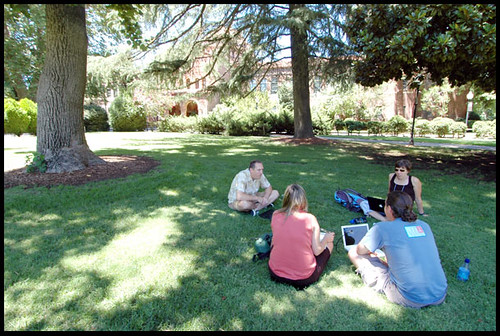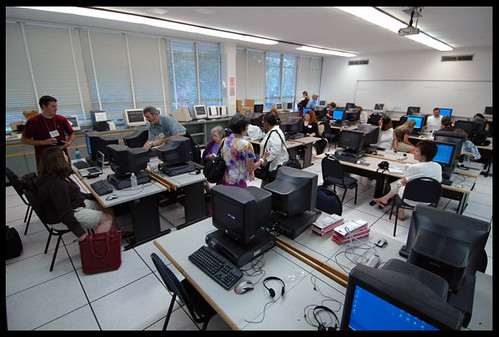Got an email yesterday about Red Clay Writing Project teacher Denise Heagle who’s now working in Arizona. She shared a recent project entitled “Poetry and Podcasting” from her ELL classroom (English Language Learners) in which students created “I Am” poems and recorded themselves reading the poems. Her class includes Somalis, Sudanese and Liberians, and a large number of her students have been living in refugee camps for the last ten years. Though many don’t have family photos, they found images online to accompany their written poetry and used the application Photo Story to put it all together. Look under “Language Program Poem #1 or #2” on her school’s preliminary website to view some of the student work (http://amphipodcast.podomatic.com). Many of these students were at the first grade reading level with their English skills. Denise wrote, “It was amazing how it took on a life of its own and the students were SO invested in it.”
I’m excited about these types of projects, and what makes kids, as Denise said, “so invested.” There’s this one phrase I’ve been carrying around with me since NWP’s Tech Matters Institute—compelling communication. After viewing the photo stories, I’m imagining Denise’s students were experiencing a compelling type of communication, one that allowed them to make meaning with images in addition to words, to explore new digital tools, and to share their texts (and get some comments) with others outside their classrooms.
Two questions come to mind: 1) What types of conversations are teachers having with students about publicly sharing their work (and their personal lives) online? and 2) How might other teachers gain from the thinking and planning behind Denise’s “Poetry and Podcasting”? I’m still thinking about the way Red Cedar Writing Project shared their tech camp plans via a wiki. I’m guessing there are some databases online for teachers to share their literacy/tech activity plans, etc., I just haven’t found them yet.
Thanks for sharing this Denise, and we miss you around here.
Wednesday, August 8
Thursday, August 2
Tech Matters 07
 Paige Cole with facilitator Peter Kittle and our friends Joe and Susan from Rutgers Writing Project
Paige Cole with facilitator Peter Kittle and our friends Joe and Susan from Rutgers Writing ProjectHowdy Red Clay,
Before too much time passes, I want to share a little about our experiences at NWPs Tech Matters institute. Paige Cole and I flew out to Chico, CA in mid-July for 4 days of mingling with other writing project folks interested in technology and writing. Heaven, right? I just wish more of you could have joined us. Imagine a summer institue about technology/writing crammed into 4 days (that's supposed to sound good, btw).
We had time to explore technologies (i.e., free online apps like Google Docs, Flickr, Wikispaces, VoiceThread) and talk about their relevance for our teaching and our lives. It's my hope that we can bring these conversations back to Red Clay and share with you some of the ideas and technologies we found exciting.

Paige and I are in the process of writing a minigrant proposal to help fund a tech learning community, and we'd like to invite you to join this tech team. If you're interested, contact me directly (johnny@uga.edu) or respond here on the blog. Enjoy the remaining days of summer!
Clarke Central's Journalism Team
Clarke Central High School, Athens, GA
I had the great pleasure of hanging out with David Ragsdale's high school journalism class yesterday afternoon at Clarke Central. It's two weeks before the official start of school and they're already working. After spending only two hours with them, I can see how their publications win awards (c.f., The Odyssey). They share with each other what they know. They solve problems together. They have fun.
We talked mostly about photography, and I brought up an issue that continues to vex me--sharing pictures of others online. With Flickr.com, for example, you can control whether pictures are private or public, but the default setting is public, and I find myself having reoccuring conversations with friends and family about the ethics of sharing photos online. David's group had some insightful comments for me to think about, namely the messiness of interpretation. I took from the conversation a good question to ask before posting: Is there any risk that this image might be harmful?
Still, I'm guessing just about everything has risk for harm. Even a seeminly innocuous image can function unpredictably in the lives of others. How do you seek balance between ethical concerns and "individual" artistic expression?


The above images were found scattered among an unsanctioned garbage dump in South Atlanta. I find them captivating and want to share them. View the whole series on my flickr account (before they come down?).
I had the great pleasure of hanging out with David Ragsdale's high school journalism class yesterday afternoon at Clarke Central. It's two weeks before the official start of school and they're already working. After spending only two hours with them, I can see how their publications win awards (c.f., The Odyssey). They share with each other what they know. They solve problems together. They have fun.
We talked mostly about photography, and I brought up an issue that continues to vex me--sharing pictures of others online. With Flickr.com, for example, you can control whether pictures are private or public, but the default setting is public, and I find myself having reoccuring conversations with friends and family about the ethics of sharing photos online. David's group had some insightful comments for me to think about, namely the messiness of interpretation. I took from the conversation a good question to ask before posting: Is there any risk that this image might be harmful?
Still, I'm guessing just about everything has risk for harm. Even a seeminly innocuous image can function unpredictably in the lives of others. How do you seek balance between ethical concerns and "individual" artistic expression?


The above images were found scattered among an unsanctioned garbage dump in South Atlanta. I find them captivating and want to share them. View the whole series on my flickr account (before they come down?).
Subscribe to:
Comments (Atom)
